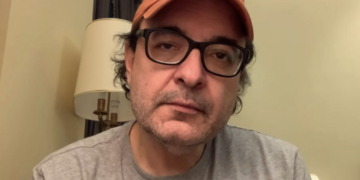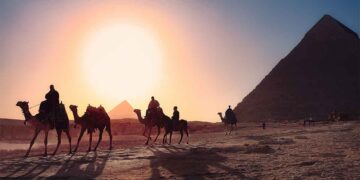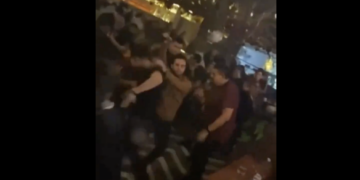In what is undoubtedly the most anticipated Q&A of this award season, and possibly any, legendary director Steven Spielberg led a conversation with Martin Scorsese on Tuesday night after a packed screening of Scorsese’s highly anticipated film, Killers of the Flower Moon. The dynamic between the two acclaimed filmmakers was likened by one Academy member to “Mozart interviewing Beethoven,” emphasizing the historic significance of this conversation.
As the two icons took the stage at the DGA Theatre in Los Angeles, they were met with a thunderous standing ovation. Spielberg expressed his admiration for Scorsese’s work, stating, “For me, this is just an exceptional experience, watching your film. You know how I feel about all of your films, but this one stands out in a way for me that’s so impactful. It’s an epic journey, but it’s not a Hollywood epic, for me; it’s a humanitarian epic.”
The conversation between the two old friends, affectionately calling each other “Steve” and “Marty,” delved into the intricate process of building trust with and working alongside members of the Osage nation. They also discussed the fact that Robert De Niro was captivated by the Osage language and expressed a desire for the entire film to be performed in it. Additionally, they praised the breakout performance of Killers of the Flower Moon lead actress Lily Gladstone, who was sitting quietly in the back row of the theater during the conversation. Gladstone later shared that it was a surreal experience to have two masters speaking in such glowing terms about her work.
Spielberg concluded the conversation by paying a heartfelt tribute to Scorsese, declaring, “You are the master of our medium, and this is your masterpiece, Marty.”
Exclusive video footage of the full conversation can be viewed on The Hollywood Reporter website.
The collaboration between Steven Spielberg and Martin Scorsese is a momentous occasion in the film industry, as it brings together two titans who have shaped the landscape of cinema. As directors, producers, and influential figures in the entertainment industry, their insights and perspectives carry significant weight and are highly valued by their peers and audiences alike.
It is evident that the admiration and respect shared between Spielberg and Scorsese run deep. Their friendship and professional relationship have spanned decades, and their continued support for each other’s work serves as a testament to the bond they have forged over the years. The opportunity to witness them engage in a dialogue about filmmaking, storytelling, and the creative process is a rare and valuable experience for cinephiles and aspiring filmmakers alike.
Killers of the Flower Moon, directed by Scorsese, has generated immense anticipation and intrigue, with its compelling narrative and powerful performances. The film delves into the haunting true story of a series of murders of Osage tribe members in the 1920s, a harrowing tale that uncovers a web of greed, conspiracy, and injustice. Scorsese’s directorial prowess and his ability to illuminate complex and profound themes through his work have solidified his status as a cinematic visionary.
The conversation between Spielberg and Scorsese sheds light on the depth and complexity of Killers of the Flower Moon, offering invaluable insights into the creative process and the dedication it takes to bring a story of this magnitude to the screen. The film’s exploration of history, culture, and the human experience resonates with audiences on a profound level, and the opportunity to hear firsthand from the filmmakers behind this project provides a deeper appreciation for the artistry and craftsmanship involved in its creation.
As the award season continues and the film industry celebrates the art of storytelling and filmmaking, the conversation between Steven Spielberg and Martin Scorsese stands as a pivotal moment that underscores the impact of visionary filmmakers and the enduring power of cinema. Their collaboration and the profound influence of their work serve as an inspiration for generations of filmmakers and audiences, reaffirming the timeless and transformative nature of storytelling through film.































































